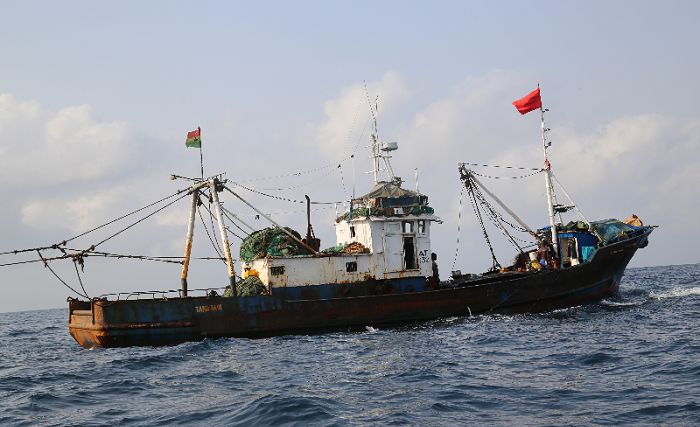
Ghana has no fishing vessel operators — Official
Ghana currently does not have any locally trained captains or engineers to operate industrial fishing vessels.
This has led to the country engaging expatriates, such as Japanese, Chinese and Koreans, to man industrial fishing vessels in its waters.
Advertisement
Speaking with the Daily Graphic in Accra last Thursday, the Office Manager of the Ghana Industrial Trawlers Association (GITA), Mr Gilbert Sam, said since Ghana did not have any locally trained captains and other key staff to operate and man industrial fishing vessels, it had no option but to rely on expatriates for such services.
“When it comes to industrial fishing, say Tuna and trawlers, we don’t have locally trained people who can man these industrial vessels; we are handicapped. Even though we have institutions that carry out some training, currently we don’t have the skippers who are the captains and engineers who can manage the vessels,” he said.
He further explained that since Ghana’s laws permitted the recruitment of expatriate fishers in its fishing industry, bringing on board foreign captains and engineers was not in contravention of the fishing regulations, saying: “Because we don’t have the technical expertise, we have to engage the services of such people to man the vessels.”
“We can hire 25 per cent of the crew being foreigners, so when we go on board industrial fishing vessels and we see other nationals, we should not say that those vessels are foreign vessels,” he added.
Vessel ownership
A recent study released by the Environmental Justice Foundation (EJF), a UK-based non-governmental organisation with focus on marine resources management, at a roundtable in Accra revealed that an estimated 90 per cent of trawlers operating in Ghana were beneficially owned by Chinese corporations.
According to findings of the study, titled: “At what cost? How Ghana is losing out in fishing arrangements with China’s distant water fleet”, the foreign owners usually operated through local front companies using opaque corporate structures to import their vessels, which they registered and with which they obtained licences to fish.
It also estimated that Ghana was currently losing between $14.4 million and $23.7 million annually in the trawl sector due to low licence fees, as well as the lack of enforcement of revenue for fisheries-related infringements.
However, the agency responsible for regulating the sector, the Fisheries Commission, has disputed the findings of the study, describing them as “unfortunate.”
Why foreigners
Mr Sam explained, for instance, that when it came to Tuna fishing, the sector was dominated by Koreans and Japanese, since they were well versed in that sector.
“For Tuna, we see the Koreans, the Japanese and other nationals managing those vessels. But because most of the trawlers are coming from China, obviously we will see Chinese on board — that does not make the vessels Chinese vessels — they are Ghanaian flagged vessels,” he said.
He said Ghana currently had about 70 to 75 vessels in its waters, out of whose fishing crew 25 per cent were expatriates.
Each vessel, he noted, had an average crew of 25.
Further explaining why industry players engaged expatriate captains and engineers, Mr Sam said since Ghana did not manufacture its own vessels, it was appropriate to engage captains and engineers from the countries in which the vessels were manufactured.
He said in the past, Ghana used to have its own captains, particularly when the state fishing company was very active.
Mr Sam hinted that the GITA was working with key stakeholders, such as the Regional Maritime University (RMU) and the Fisheries Commission, to get some Ghanaians trained as captains to man industrial fishing vessels in the country.
RMU disagrees
However, the Dean of the Graduate School of the RMU, Dr York Ababio, partly disagreed with Mr Sam’s claim that Ghana did not have locally trained captains and engineers to man its fishing vessels.
For him, the lack of employment opportunities had driven many Ghanaian trained captains, engineers and other key deck officers away from the fishing industry.
He explained that because many of the fishing vessels were foreigner owned, and the country’s laws permitted a certain percentage of the crew to be foreigners, the owners of the vessels tended to bring in their own captains and other key staff, leaving only the minor positions for Ghanaians, thereby denying Ghanaian trained captains and engineers the opportunity to get employed.
Dr Ababio said many Ghanaian captains who were frustrated by the situation had left the country to seek opportunities elsewhere.
For him, until the country changed the clause in its fisheries laws and specifically defined which roles could be allowed foreigners to take on the vessels, owners of the vessels, who are foreigners, would continue to reserve the key positions for their compatriots.
He said the RMU had all the programmes to train any type of staff needed to operate any fishing vessel in the country.
Dr Ababio said in spite of the capacity of the university to train Ghanaians to man fishing vessels, many people were not going for the course, since they knew there would be no employment for them after their training.
He said when Ghana’s fishing companies were very active, all the captains and other key officers on the vessels were trained in Ghana.



